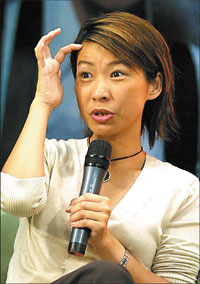Leading is about caring
Updated: 2007-09-06 06:35
If each of us were to define a leader, there would be many different answers. A leader can be one who leads others, or someone in charge of a political party or an organization. A leader can be someone of political influence, or someone who can influence or change another person's mind.
Indeed, given the wide number of definitions, it's clear that we have many so-called leaders around us. But if you ask me who I would vote for to be a qualified young leader, my criteria would be very simple. I would only vote for those who care about society, who can take on and meet social responsibilities. As for those who are successful in their own fields, I would simply call them successful people - not leaders.
China is growing rapidly and is undergoing a period of great transition. No longer can anyone doubt the impact of the country, be it economically, politically or culturally. Asking an American to spend one day without a "Made in China" product might prove disastrous, or at least seriously uncomfortable.
For those of us who live and work in China every day, not only the rapid and exciting development of our country but also the problems and challenges it is facing must be very evident. The widening gap between rich and poor, increasing environmental degradation and the critical necessity of a robust rule of law are just a few examples, all of which will have an impact on China's sustainable development and its future.
In this backdrop, what kind of responsibilities do young Chinese leaders have? Of paramount importance is fulfilling our responsibility to care about our society and help build civil society in China. We should lead by example and not only be good citizens ourselves, but persuade others to be as well.
Indeed, a young leader in China has a lot of responsibilities. He or she must not be short-sighted but possess a long-term vision. In addition, young leaders must keep the environmental issue in the forefront as an environmental crisis could limit future growth.

Recent incidents like the Taihu water pollution and the PX project in Xiamen came and went without a single outcry from the young Chinese elite. No one stood up and spoke out in public interest, no one said we should not sacrifice our environment for the sake of growth. While a few grassroots activists and some segments of the media did speak out, the young elite in China were silent.
The brick kiln slavery affair is another example. Who spoke for the poor and the powerless? Who pushed the government to investigate the case? Not the young Chinese elite, but the grassroots activists and the media.
I recently spoke to a young lawyer who is offering the workers free legal services to sue the factory owner. He is certainly not considered "elite" in China because he is neither famous nor rich, nor does he have any outstanding achievements. But to me, he is the personification of the type of young leader we need today in China.
The young elite in China might respond by saying that they care about more important, systemic and macro-level issues, and don't have the time to get bogged down in the micro level. Yet, if people lack the understanding of the basic levels of society and are completely out of touch with the concerns and needs of the people, their macro concerns are but an empty gong.
As a journalist in China, I face these issues every day. I know what I can do is limited, but I also know this cannot be an excuse to do nothing. My colleagues and I are trying to do something that can make society change, even if that change is only very minor. We hope our country can be developed steadily and that these small changes will count.
I recently set up a website with some of my friends. We hope not only to promote the idea of "citizen journalism" in China but also give people a platform to deliver more information to young Chinese. We will try our best to encourage people to use multiple modes of thinking and to ask prescient and critical questions.
We care deeply about social equity, justice and environment, and will try to raise awareness of these issues and make people focus on them. We believe these are the urgent issues in China that we must face and resolve. Facing and resolving them is the only way forward and their resolution will be the ultimate test of our leadership.
As one of the Young Global Leaders, it is my hope that more and more leaders will join us and become involved in the process of building civil society in China. We can use our influence, our resources and our power together to do something for China's sustainable development. If we do, we may even earn the honor of being called leaders.
The author is a Young Global Leader of the World Economic Forum and Executive News Editor, Phoenix Satellite Television Co, Hong Kong
(China Daily 09/05/2007 page7)
|
|
|
||
|
||
|
|
|
|